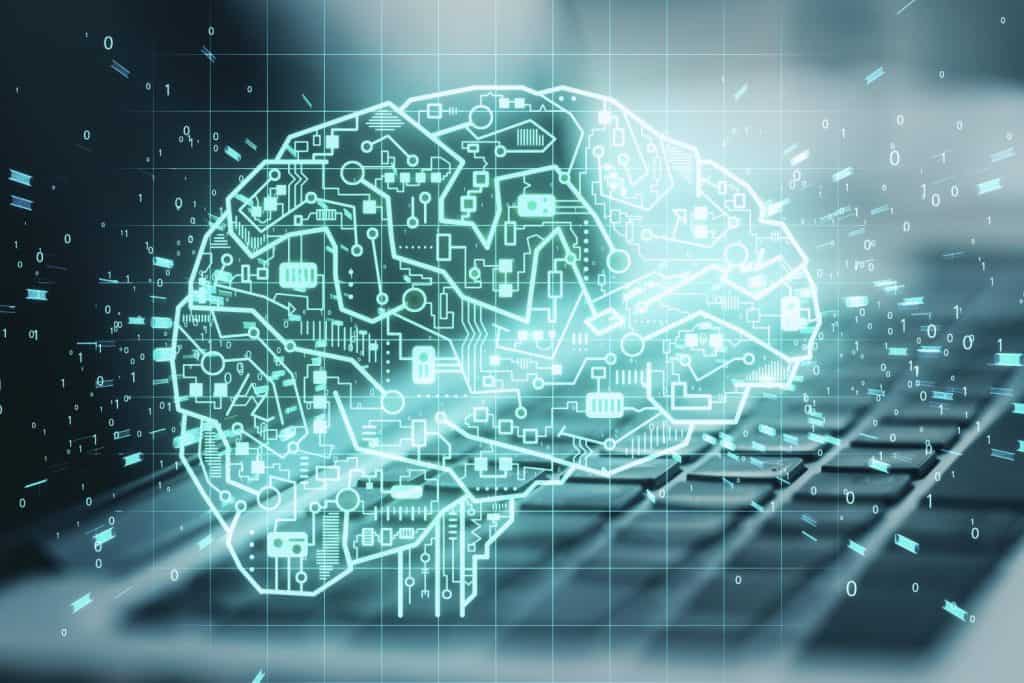
© Golden Dayz/Shutterstock.com
Key Points
- There are many ethical challenges to consider when looking at artificial intelligence.
- A lack of privacy is one of the foremost concerns when integrating AI into your office.
- Learning how to navigate these challenges allows AI to take the reins and increase productivity.
What ethical challenges does AI pose? Anywhere you look now, there is no shortage of artificial intelligence systems in workplaces around the world. For some companies, this comes down to multiple systems working in concert with one another to achieve goals.
Many industries have embraced AI, but that doesn’t mean it is a panacea for that which ails you. Many top thinkers are pondering the far-reaching implications of using AI in the first place. With that in mind, let’s take a closer look at the real moral quandaries posed by the rapid ascent of AI.
AI in Businesses

©Golden Dayz/Shutterstock.com
We are two years out from the adoption of AI by the general populace. In that time, we’ve seen an explosion of new tools, bespoke platforms, and whole new ways of approaching traditional production paradigms. The usage of AI is in everything from e-commerce to automobile manufacturing.
However, like any new technology, it presents inherent risks and drawbacks. Much like the business world goes through teething pains with the adoption of a new operating system for work computers, it seems unusual to even think about this latest technological development serving as the bedrock of vital operations in any industry.
That said, we are seeing more and more that AI is a potent tool. When utilized correctly, it can operate well beyond human means. As a general example, we’ve seen artificial intelligence used in the healthcare professions as a shockingly effective means of diagnosing potential health problems.
Imagine what it could do for the likes of your statistical analysis, sales reports, or even just monitoring general processes in a production line.
Relevant Statistics
As with any new burgeoning technology, it is important to take a look at the facts. A recent article by Katherine Haan at Forbes details the ways businesses are utilizing artificial intelligence. Out of the many use cases, the shocking truth is that over 97% of business owners polled see some usage of the popular platform ChatGPT as a means of increasing productivity and efficiency at their business.
Further, nearly 46% of all business owners craft internal communications. These would be your memos, chat messages, emails, and other internal documents intended for your workforce. However, out of those polled, at least 40% expressed concern about an over-reliance on technology with the advent of artificial intelligence.
You can’t put the cork back in the bottle when it comes to new technological developments. As such, the business owners surveyed are likely on to something. This could be the way of the future, provided new and more effective means of automation don’t arise in the next decade or so.
That said, it would seem that businesses are fully on board with artificial intelligence. This might not be the leading thought in the general populace. Artificial intelligence seems little more than a high-tech plaything to someone installing an app on their smartphone.
The Ethical Challenges of AI
So, we’ve talked at length about AI and how it is impacting the workplace. But, what are the ethical challenges associated with artificial intelligence? Beyond the simple things like the use of copyrighted materials for the training of models, there is more at play.
New technologies always present new quandaries and questions. Think back to the introduction of the internet, social media, and smartphones. While these seem like old hat now, they posed many similar questions by philosophers and think tanks.
That said, the questions posed by artificial intelligence have an inherent sense of danger about them. Let’s explore them a little more to see what can be done to rectify or at least mitigate the damage caused by them.
A Lack of Objectivity
I can hear you asking about this one. Why doesn’t artificial intelligence have objectivity? One of the biggest ethical challenges associated with this technology comes about due to the inherent bias found in any programmed piece of software.
Software like AI is created by people. People have their own biases, conscious and unconscious. When writing any piece of software, those biases are going to bleed through. You also need to consider the materials used for training something like a large language model.
While these can generate content like no one’s business, there is still the simple fact that all material is derived from human beings. When you have people in the equation, there is bound to be some subjectivity moving to the fore. As such, if you’re looking for an impartial
Human Rationality
Working in conjunction with inherent bias is the lack of human rationality. If your team lead comes to you with a problem that needs solving, you can typically get down to brass tacks while making a decision that benefits the organization.
Now, imagine that the same decision is delegated to an AI. While it might present a workable solution, it isn’t going to keep in mind all the factors that impact a team or organization. Now, some proponents of AI argue that this sort of concern is overstated.
However, we do have to keep in mind the very real impact any decision given to a machine is going to have. If we cannot eliminate bias, are we going to trust artificial intelligence to make a decision that is beneficial for everyone involved?
Privacy
I come from a background in IT, so I understand GRC better than most. Simply put, if you’re in any position where you’re collecting information from customers, it needs to be safeguarded. Think about it, if you’re storing things like home addresses, names, and social security numbers, those are the keys to anyone’s identity.
At the end of the day, one of the largest ethical challenges in AI comes in the form of privacy. One of the biggest complaints associated with something like the ever-present ChatGPT is the lack of clarity and transparency about what is happening with your data. We can hazard a guess that your prompts and inputs are being used to train the model at the heart of the application.
So, what does that mean for industries where that information needs to be accounted for? Well, it looks quite grim, to be frank. If you cannot trust a vendor to reliably tell you what is happening with your data, what happens in the event of a data breach?
That isn’t even a matter of if, but rather when.
How Do You Mitigate These Challenges?

Now that we’ve outlined some of the ethical challenges associated with artificial intelligence, how do you get past them? AI isn’t going away anytime soon, but that doesn’t mean you need to operate on its whims.
Like any piece of software, you have to make it for you. One of the biggest things you can do is use AI as simply a tool. I wouldn’t use it to replace human tasks unless they are simply too tedious and repetitive to get around. However, as something to make life just a little bit easier, AI is a powerful utility.
Automation has been present in the workplace for decades, so just think of artificial intelligence as the next natural evolution of such practices.
A Good Balance
Further, one of the easiest ways to navigate the ethical challenges of AI is to strike a fine balance. Just thinking in terms of my tech background, I wouldn’t relegate AI for the likes of generating scripts for pushing updates to a series of servers.
However, I would use AI to crunch the numbers on how many stations need those updates. As such, I keep the process in my hands while still harnessing AI to take some of the more tedious legwork out of my overall workflow.
This same approach can be taken when looking at any industry. Striking a fine balance where your human talent shines while harnessing the power of artificial intelligence makes a fair amount of sense. But please, for the love of everything, don’t generate emails to your employees with artificial intelligence.
It might take time, but the written word deserves a human touch.
Real-World Implications of Artificial Intelligence

We’ve discussed the ethical challenges of artificial intelligence, but what are the implications in a real-world scenario? Let’s consider for a moment that you’re in charge of patient data at a major metropolitan hospital. Not only do you have to consider your patients, but you have to safeguard all their data.
You’ve been told to utilize ChatGPT to collate patient information into spreadsheets for export to an SQL database. In the past, this is something you would have done by hand. You’re digitizing paperwork into hard links in a searchable database. However, ChatGPT cuts the work out, letting you get to more important tasks.
However, one day, OpenAI suffers a data breach. The lack of privacy is now fully exposed. You’ve got government regulatory bodies wondering why you were utilizing artificial intelligence on sensitive data. ChatGPT might have saved time, but those ethical challenges are alive and well.
Other Useful Tools and Concepts
Artificial intelligence isn’t all doom and gloom. It is certainly one of the most exciting prospects to come about in the last twenty years on the digital forefront. As such, I heavily recommend our guide to take a closer look at how AI is impacting businesses today.
Further, after discussing data at length, it might do you well to take a closer look at the Six Sigma methodology. Six Sigma is one of the leading forces driving businesses in the modern era. It takes a data-driven approach to navigating the challenges and pitfalls of modern production.
Our comprehensive guide covers the basics of the methodology and why someone at your organization might want to get certified.
Conclusion
So, are the ethical challenges of AI worth considering? They certainly are, but as with any new technology, it is about adapting to the challenges. Any new piece of technology is going to have drawbacks and concerns. However, learning how to best navigate those to make ap positive impact on your organization is a surefire way to success.
As such, feel free to use AI. However, make sure you heed some of the warnings contained throughout this article. There are some real-world implications in trusting sensitive information and decision-making to an artificial intelligence. At the end of the day, a person is going to do some things better.
The image featured at the top of this post is ©Golden Dayz/Shutterstock.com.